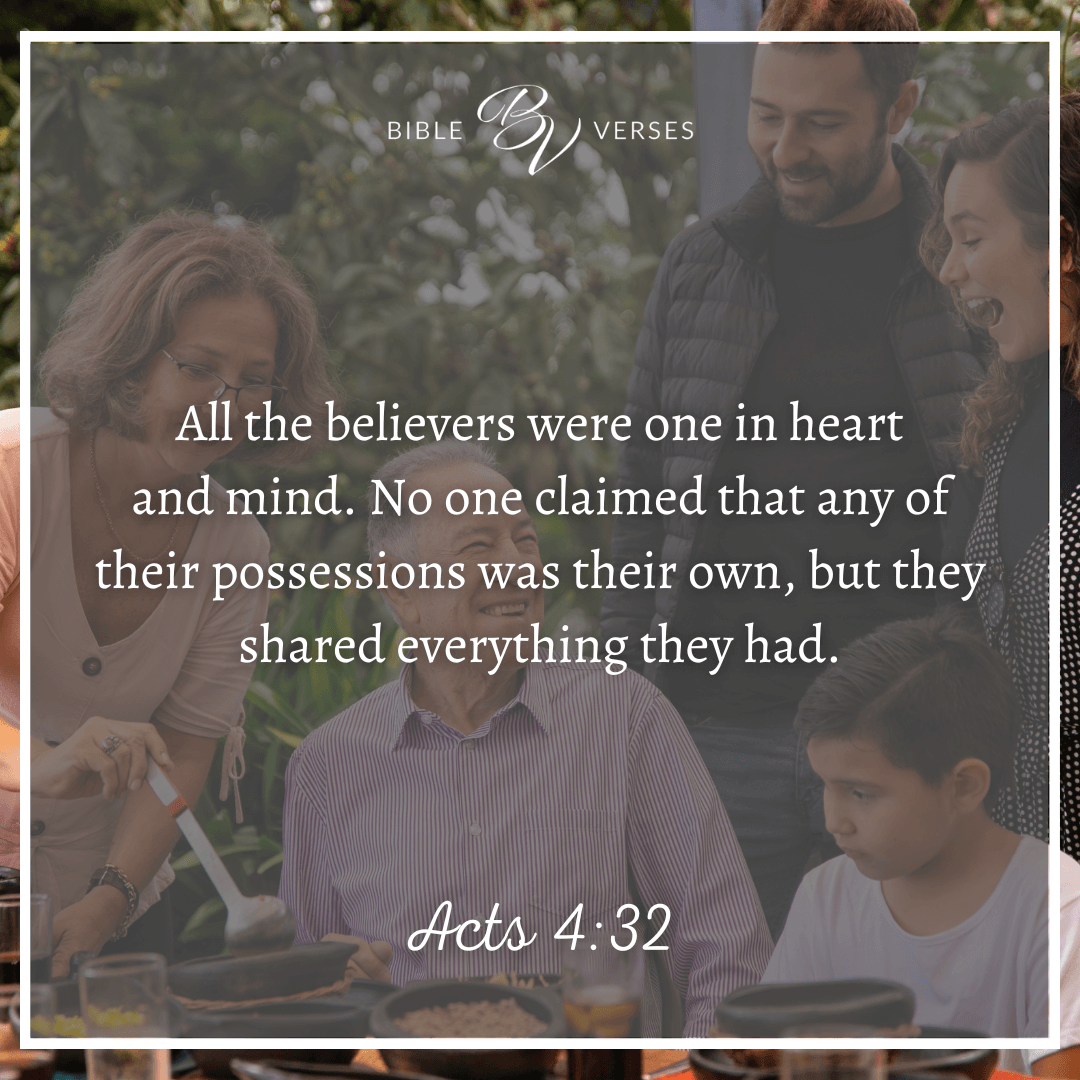United in Faith: 15 Bible Verses About Community
From the earliest pages of the Bible to its final verses, the importance of community resonates profoundly. Whether it’s the fellowship shared among believers, the support offered in times of need, or the collective worship of God, the scriptures offer rich wisdom on the significance of community.
Join us as we delve into these bible verses about community– it’s power, purpose, and blessings!
Quotes on Community
Community in the Bible
Psalm 133:1
Behold, how good and how pleasant it is for brethren to dwell together in unity!
How good and pleasant it is
when God’s people live together in unity!
How wonderful and pleasant it is
when brothers live together in harmony!
Behold, how good and pleasant it is
when brothers dwell in unity!

This verse emphasizes the beauty and desirability of unity among brothers, or more broadly, among people. It celebrates the harmony and sense of peace that arises when individuals come together in mutual respect and cooperation under the umbrella of faith in our God.
Psalm 133:1 reminds believers of the importance of unity within communities, families, and all human relationships, highlighting its goodness and pleasantness in the eyes of God.
Proverbs 27:17
Iron sharpeneth iron; so a man sharpeneth the countenance of his friend.
As iron sharpens iron,
so one person sharpens another.
As iron sharpens iron,
so a friend sharpens a friend.
Iron sharpens iron,
and one man sharpens another.

This verse uses a metaphor to convey the idea that just as iron tools are sharpened and made more effective through friction with other iron, people can sharpen and improve one another through their interactions, discussions, and relationships.
It underscores the value of companionship, accountability, and mutual encouragement in personal growth and character development.
In essence, Proverbs 27:17 encourages believers to seek out meaningful relationships that challenge, inspire, and refine them.
Ecclesiastes 4:9-12
Two are better than one; because they have a good reward for their labour.
For if they fall, the one will lift up his fellow: but woe to him that is alone when he falleth; for he hath not another to help him up.
Again, if two lie together, then they have heat: but how can one be warm alone?
And if one prevail against him, two shall withstand him; and a threefold cord is not quickly broken.
Two are better than one,
because they have a good return for their labor:
If either of them falls down,
one can help the other up.
But pity anyone who falls
and has no one to help them up.
Also, if two lie down together, they will keep warm.
But how can one keep warm alone?
Though one may be overpowered,
two can defend themselves.
A cord of three strands is not quickly broken.
Two people are better off than one, for they can help each other succeed. If one person falls, the other can reach out and help. But someone who falls alone is in real trouble. Likewise, two people lying close together can keep each other warm. But how can one be warm alone? A person standing alone can be attacked and defeated, but two can stand back-to-back and conquer. Three are even better, for a triple-braided cord is not easily broken.
Two are better than one, because they have a good reward for their toil. For if they fall, one will lift up his fellow. But woe to him who is alone when he falls and has not another to lift him up! Again, if two lie together, they keep warm, but how can one keep warm alone? And though a man might prevail against one who is alone, two will withstand him—a threefold cord is not quickly broken.

This passage of scripture explores the benefits of companionship, cooperation, and mutual support in various aspects of life. It emphasizes that having someone to share labor, offer assistance in times of need, provide warmth and comfort, and offer protection can significantly enhance one’s quality of life and resilience against adversity.
The imagery of a cord of three strands not being easily broken underscores the strength and durability of unity and collaboration.
Matthew 18:20
For where two or three are gathered together in my name, there am I in the midst of them.
For where two or three gather in my name, there am I with them.
For where two or three gather together as my followers, I am there among them.
For where two or three are gathered in my name, there am I among them.

This verse is often cited in discussions about the power and significance of communal prayer and worship. It emphasizes the presence of Jesus among believers when they come together in unity, invoking his name and sharing in fellowship.
Whether it’s for prayer, study, or mutual support, the verse highlights the spiritual importance and efficacy of communal gatherings for Christians. It encourages believers to come together in faith, knowing that Jesus is present with them, guiding, comforting, and strengthening them as they seek his presence collectively.
Acts 4:32
And the multitude of them that believed were of one heart and of one soul: neither said any of them that ought of the things which he possessed was his own; but they had all things common.
All the believers were one in heart and mind. No one claimed that any of their possessions was their own, but they shared everything they had.
All the believers were united in heart and mind. And they felt that what they owned was not their own, so they shared everything they had.
Now the full number of those who believed were of one heart and soul, and no one said that any of the things that belonged to him was his own, but they had everything in common.

This verse describes the early Christian community in Jerusalem after the Day of Pentecost. It portrays the deep unity and solidarity among believers, emphasizing their shared commitment to each other and to the teachings of Jesus Christ.
The believers were not only united in heart and mind but also in their practical care and concern for one another. They demonstrated this unity by freely sharing their material possessions, ensuring that no one among them was in need.
Acts 4:32 serves as a powerful example of the ideal of Christian community, marked by love and generosity.
Romans 12:16
Be of the same mind one toward another. Mind not high things, but condescend to men of low estate. Be not wise in your own conceits.
Live in harmony with one another. Do not be proud, but be willing to associate with people of low position. Do not be conceited.
Live in harmony with each other. Don’t be too proud to enjoy the company of ordinary people. And don’t think you know it all!
Live in harmony with one another. Do not be haughty, but associate with the lowly. Never be wise in your own sight.

This verse encapsulates a key principle of Christian living: humility and harmony in relationships. It encourages believers to prioritize unity and peace in their interactions with others, regardless of social status or differences.
The verse advises against pride and arrogance, instead urging humility and a willingness to associate with those who may be considered less prestigious or influential in society.
By promoting a spirit of humility and inclusivity, Romans 12:16 fosters an environment of mutual respect, empathy, and cooperation.
1 Corinthians 1:10
Now I beseech you, brethren, by the name of our Lord Jesus Christ, that ye all speak the same thing, and that there be no divisions among you; but that ye be perfectly joined together in the same mind and in the same judgment.
I appeal to you, brothers and sisters, in the name of our Lord Jesus Christ, that all of you agree with one another in what you say and that there be no divisions among you, but that you be perfectly united in mind and thought.
I appeal to you, dear brothers and sisters, by the authority of our Lord Jesus Christ, to live in harmony with each other. Let there be no divisions in the church. Rather, be of one mind, united in thought and purpose.
I appeal to you, brothers, by the name of our Lord Jesus Christ, that all of you agree, and that there be no divisions among you, but that you be united in the same mind and the same judgment.

This verse addresses the issue of divisions and disagreements within the Corinthian church. The Apostle Paul urges the believers to strive for unity and harmony in their faith and relationships. He emphasizes the importance of being of one mind and avoiding divisions that can hinder the effectiveness of their witness and ministry.
By appealing to them in the name of Jesus Christ, Paul calls for a unified approach to faith and practice, rooted in their shared commitment to Christ, all for the advancement of the Gospel.
2 Corinthians 13:11
Finally, brethren, farewell. Be perfect, be of good comfort, be of one mind, live in peace; and the God of love and peace shall be with you.
Finally, brothers and sisters, rejoice! Strive for full restoration, encourage one another, be of one mind, live in peace. And the God of love and peace will be with you.
Dear brothers and sisters, I close my letter with these last words: Be joyful. Grow to maturity. Encourage each other. Live in harmony and peace. Then the God of love and peace will be with you.
Finally, brothers, rejoice. Aim for restoration, comfort one another, agree with one another, live in peace; and the God of love and peace will be with you.

In this verse, the Apostle Paul concludes his letter to the Corinthians with a series of exhortations aimed at promoting unity, restoration, and peace within the Christian community.
He encourages believers to rejoice in their faith, to pursue reconciliation and restoration in their relationships, to offer encouragement to one another, and to strive for unity of mind and purpose.
Paul emphasizes the importance of living in peace with one another, knowing that when believers embody these virtues, they experience the presence and blessing of God, who is characterized by love and peace.
Galatians 6:2
Bear ye one another’s burdens, and so fulfil the law of Christ.
Carry each other’s burdens, and in this way you will fulfill the law of Christ.
Share each other’s burdens, and in this way obey the law of Christ.
Bear one another’s burdens, and so fulfill the law of Christ.

This verse encapsulates the essence of Christian love and community. It instructs believers to support and help one another in times of need, bearing each other’s burdens.
This act of selflessness and compassion reflects the teachings and example of Jesus Christ, who demonstrated love through sacrificial service. By bearing one another’s burdens, believers fulfill the “law of Christ,” which is the law of love and compassion.
Galatians 6:2 underscores the importance of empathy, solidarity, and practical care within the Christian community.
Ephesians 4:2-3
With all lowliness and meekness, with longsuffering, forbearing one another in love; Endeavouring to keep the unity of the Spirit in the bond of peace.
Be completely humble and gentle; be patient, bearing with one another in love. Make every effort to keep the unity of the Spirit through the bond of peace.
Always be humble and gentle. Be patient with each other, making allowance for each other’s faults because of your love. Make every effort to keep yourselves united in the Spirit, binding yourselves together with peace.
with all humility and gentleness, with patience, bearing with one another in love, eager to maintain the unity of the Spirit in the bond of peace.

In these verses, the Apostle Paul again exhorts believers to embody qualities that promote unity and harmony within the Christian community. He encourages humility, gentleness, patience, and love as essential virtues for maintaining strong relationships with one another.
Paul emphasizes the importance of bearing with one another’s shortcomings and differences in a spirit of love and understanding. Additionally, he urges believers to make every effort to preserve the unity that is brought about by the Holy Spirit, the bond of peace as the foundation for Christian fellowship.
Ephesians 4:2-3 highlights the values that are essential for building and maintaining a vibrant and unified church community.
1 Thessalonians 5:14
Now we exhort you, brethren, warn them that are unruly, comfort the feebleminded, support the weak, be patient toward all men.
And we urge you, brothers and sisters, warn those who are idle and disruptive, encourage the disheartened, help the weak, be patient with everyone.
Brothers and sisters, we urge you to warn those who are lazy. Encourage those who are timid. Take tender care of those who are weak. Be patient with everyone.
And we urge you, brothers, admonish the idle, encourage the fainthearted, help the weak, be patient with them all.

In this verse, the Apostle Paul urges believers to take an active role in supporting and caring for one another. Specifically, Paul encourages believers to:
- Warn those who are idle and disruptive: Address any behavior or attitudes that are contrary to the teachings of the faith and disrupt the unity and peace of the community.
- Encourage the disheartened: Offer support, comfort, and words of encouragement to those who are feeling discouraged or despondent.
- Help the weak: Provide assistance and practical support to those who are struggling physically, emotionally, or spiritually.
- Be patient with everyone: Practice patience and forbearance in all interactions, recognizing that everyone has their own struggles and shortcomings.
Hebrews 10:24-25
And let us consider one another to provoke unto love and to good works:
Not forsaking the assembling of ourselves together, as the manner of some is; but exhorting one another: and so much the more, as ye see the day approaching.
And let us consider how we may spur one another on toward love and good deeds, not giving up meeting together, as some are in the habit of doing, but encouraging one another—and all the more as you see the Day approaching.
Let us think of ways to motivate one another to acts of love and good works. And let us not neglect our meeting together, as some people do, but encourage one another, especially now that the day of his return is drawing near.
And let us consider how to stir up one another to love and good works, not neglecting to meet together, as is the habit of some, but encouraging one another, and all the more as you see the Day drawing near.

In this passage, the author of Hebrews lays out the importance of active participation in the life of the Christians, emphasizing the mutual responsibility of believers to encourage and uplift one another in their faith journey, particularly as the return of Christ draws nearer. Specifically:
- Spurring one another on toward love and good deeds: Encouraging and motivating fellow believers to live lives characterized by love for one another and by actively doing good works.
- Not neglecting to meet together: Emphasizing the significance of regular gatherings for worship, fellowship, and mutual edification. The author warns against the habit of forsaking the assembly of believers, highlighting the value of communal worship and spiritual nourishment.
- Encouraging one another: Building up and supporting fellow believers through words of encouragement, exhortation, and affirmation, especially in the face of challenges or persecution.
1 Peter 3:8
Finally, be ye all of one mind, having compassion one of another, love as brethren, be pitiful, be courteous:
Finally, all of you, be like-minded, be sympathetic, love one another, be compassionate and humble.
Finally, all of you should be of one mind. Sympathize with each other. Love each other as brothers and sisters. Be tenderhearted, and keep a humble attitude.
Finally, all of you, have unity of mind, sympathy, brotherly love, a tender heart, and a humble mind.

In 1 Peter 3:8, the Apostle Peter underscores the significance of demonstrating genuine love, compassion, and sympathy toward fellow believers, urging them to extend kindness and understanding, especially in times of trial.
He emphasizes the value of humility, urging believers to recognize their own limitations and weaknesses while esteeming others above themselves.
1 John 4:7
Beloved, let us love one another: for love is of God; and every one that loveth is born of God, and knoweth God.
Dear friends, let us love one another, for love comes from God. Everyone who loves has been born of God and knows God.
Dear friends, let us continue to love one another, for love comes from God. Anyone who loves is a child of God and knows God.
Beloved, let us love one another, for love is from God, and whoever loves has been born of God and knows God.

In this verse, the Apostle John zooms in on the central importance of love amongst Christians. He addresses fellow believers as “dear friends” and implores them to love one another.
This love originates from God Himself. Furthermore, the verse suggests that love is not just a moral imperative but also a sign of one’s relationship with God. Those who truly love are evidence of being born of God and having a genuine relationship with Him.
God’s love is the ultimate source and model for believers, and this verse calls upon them to express this love in their relationships with one another.
James 5:16
Confess your faults one to another, and pray one for another, that ye may be healed. The effectual fervent prayer of a righteous man availeth much.
Therefore confess your sins to each other and pray for each other so that you may be healed. The prayer of a righteous person is powerful and effective.
Confess your sins to each other and pray for each other so that you may be healed. The earnest prayer of a righteous person has great power and produces wonderful results.
Therefore, confess your sins to one another and pray for one another, that you may be healed. The prayer of a righteous person has great power as it is working.

In this verse, the author, traditionally attributed to James the brother of Jesus, encourages believers to confess their sins to one another and to pray for each other’s healing.
By confessing their sins to one another, believers can find support, encouragement, and accountability in their journey of faith. Additionally, the verse highlights the power of prayer, suggesting that the prayers of righteous individuals are effective and have the potential to bring about healing and transformation in the lives of others.











